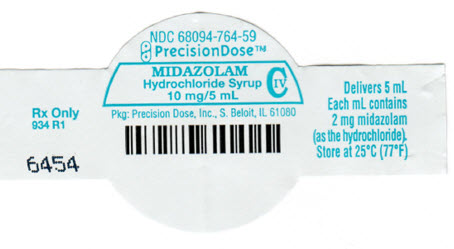Midazolam Hydrochloride Syrup while Breastfeeding

What is Midazolam Hydrochloride Syrup used for?
I am breastfeeding mother and I am using Midazolam Hydrochloride Syrup. Can it have any bad effect on my kid? Shall I search for better alternative?

Nursing Mothers Midazolam is excreted in human milk. Caution should be exercised when midazolam syrup is administered to a nursing woman.
Midazolam Hydrochloride Syrup Breastfeeding Analsys
Midazolam while Breastfeeding
SafeCAS Number: 59467-70-8
Used for sedation in preoperative anesthetic procedures. After 4 hours there is not any trace of the drug in mother’s blood.
Midazolam Hydrochloride Syrup Breastfeeding Analsys - 2
Midazolam while Breastfeeding
CAS Number: 59467-70-8
The small amounts of midazolam excreted into breastmilk would not be expected to cause adverse effects in most breastfed infants. Two expert panels advocates waiting for at least 4 hours after a single intravenous dose of midazolam (e.g., for endoscopy) before resuming nursing.[1][2] However, no waiting period or discarding of milk might be necessary before resuming breastfeeding after a single dose of midazolam in the mothers of infants over 2 months of age. After general anesthesia, breastfeeding can be resumed as soon as the mother has recovered sufficiently from general anesthesia to nurse.[3][4][5] When a combination of anesthetic agents is used for a procedure, follow the recommendations for the most problematic medication used during the procedure. With prolonged use (days) of intravenous therapy, an active metabolite can accumulate in the mother and might affect the infant, but data in breastfeeding are lacking.
What should I do if I am breastfeeding mother and I am already exposed to Midazolam Hydrochloride Syrup?
Midazolam Hydrochloride Syrup is safe in breastfeeding and should not create any health problem for your baby but in case you feel any health issue associated with Midazolam Hydrochloride Syrup you should contact your doctor or health care provider. Be it pregnancy or lactation you shall keep your doctor informed.
I am nursing mother and my doctor has suggested me to use Midazolam Hydrochloride Syrup, is it safe?
Definitely, Midazolam Hydrochloride Syrup is safe in lactation for baby. No wonder your doctor has recommended it.
If I am using Midazolam Hydrochloride Syrup, will my baby need extra monitoring?
No extra baby monitoring required while mother is using Midazolam Hydrochloride Syrup
Who can I talk to if I have questions about usage of Midazolam Hydrochloride Syrup in breastfeeding?
US
National Womens Health and Breastfeeding Helpline: 800-994-9662 (TDD 888-220-5446) 9 a.m. and 6 p.m. ET, Monday through Friday
UK
National Breastfeeding Helpline: 0300-100-0212 9.30am to 9.30pm, daily
Association of Breastfeeding Mothers: 0300-330-5453
La Leche League: 0345-120-2918
The Breastfeeding Network supporter line in Bengali and Sylheti: 0300-456-2421
National Childbirth Trust (NCT): 0300-330-0700
Australia
National Breastfeeding Helpline: 1800-686-268 24 hours a day, 7 days a week
Canada
Telehealth Ontario for breastfeeding: 1-866-797-0000 24 hours a day, 7 days a week
